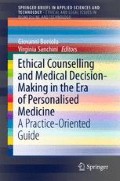Abstract
This chapter deals with the ethical controversies related to the so-called right-not-to-know in biomedicine. By problematizing the substantive conflicts at the basis of patient’s decision to waive some health-related information, the chapter provides a normative map for instructing the practice of Ethical Counselling in the face of these claims. In particular, it is argued that both self-regarding and other-regarding considerations in the exercise of the right-not-to-know may ground or dismiss its ethical and legal legitimacy and may prove fundamental aspects of ethical counselling processes.
Access this chapter
Tax calculation will be finalised at checkout
Purchases are for personal use only
Notes
- 1.
This is not meant to affirm that genetic information differs, in an ethically relevant manner, from other types of medical information. Rather, this chapter will treat genetic knowledge very much like any other kind of knowledge about our health, thus rejecting claims of ‘genetic exceptionalism’. For a discussion of the reasons in favour and against genetic exceptionalism, see Green and Botkin (2003), Rothstein (2007).
- 2.
By “welfarist considerations” we mean here to refer, very broadly, to the justificatory nature that affecting the well-being of an individual may have for guiding human agency. For a philosophical introduction to the concept of well-being and its normative import on welfarist moral theories, see Roger Crisp’s entry “Well-being” in the Stanford Encyclopedia of Philosophy.
- 3.
Very much like in the case of ‘welfarism’ above, the reader who may want to plunge into the philosophical debate on the concept of autonomy may find useful to consult John Christman’s “Autonomy in Moral and Political Philosophy” in the Stanford Encyclopedia of Philosophy.
- 4.
Council of Europe (1997a).
- 5.
Council of Europe (1997b).
- 6.
UNESCO (1997).
- 7.
World Health Organization (1998).
- 8.
The fact-sheet on the XYY syndrome by Genetic Alliance UK can be found at the following address: http://www.geneticalliance.org.uk/docs/translations/english/25-xyyt.pdf (last accessed: July, 1 2015).
References
Andorno R (2004) The right not to know: an autonomy based approach. J Med Ethics 30:435–439
Christman J (2015) Autonomy in moral and political philosophy. In: Zalta EN (ed) The stanford encyclopedia of philosophy. Available at: http://plato.stanford.edu/archives/spr2015/entries/autonomy-moral. Last accessed 1 July 2015
Council of Europe (1997a) Convention on human rights and biomedicine. Available at: http://conventions.coe.int/Treaty/en/Treaties/Html/164.htm. Last accessed 1 July 2015
Council of Europe (1997b) Explanatory report of the convention on human rights and biomedicine. Available at: http://conventions.coe.int/Treaty/EN/Reports/Html/164.htm. Last accessed 1 July 2015
Crisp R (2015) Well-being. In: Zalta EN (ed) The stanford encyclopedia of philosophy (Summer 2015 edition). Available at: http://plato.stanford.edu/archives/sum2015/entries/well-being. Last accessed 1 July 2015
Green MJ, Botkin JR (2003) Genetic exceptionalism. In medicine: clarifying the differences between genetic and nongenetic tests. Ann Intern Med 138:571–575
Ost DE (1984) The ‘right’ not to know. J Med Philos 9:301–312
Robertson S, Savulescu J (2001) Is there a case in favour of predictive genetic testing in young children? Bioethics 15:26–49
Rothstein MA (2007) Genetic exceptionalism and legislative pragmatism. J Law Med Ethics 35:59–65
UNESCO (1997) Universal declaration on the human genome and human rights. Available at: http://portal.unesco.org/en/ev.php-URL_ID=13177&URL_DO=DO_TOPIC&URL_SECTION=201.html. Last accessed 1 July 2015
World Health Organization (1998) Guidelines on ethical issues in medical genetics and the provision of genetic service. Available at: http://www.who.int/genomics/publications/en/ethicalguidelines1998.pdf. Last accessed 1 July 2015
Author information
Authors and Affiliations
Corresponding author
Editor information
Editors and Affiliations
Rights and permissions
Copyright information
© 2016 The Author(s)
About this chapter
Cite this chapter
Chiapperino, L. (2016). The ‘Right-not-to-Know’. In: Boniolo, G., Sanchini, V. (eds) Ethical Counselling and Medical Decision-Making in the Era of Personalised Medicine. SpringerBriefs in Applied Sciences and Technology(). Springer, Cham. https://doi.org/10.1007/978-3-319-27690-8_8
Download citation
DOI: https://doi.org/10.1007/978-3-319-27690-8_8
Published:
Publisher Name: Springer, Cham
Print ISBN: 978-3-319-27688-5
Online ISBN: 978-3-319-27690-8
eBook Packages: EngineeringEngineering (R0)

